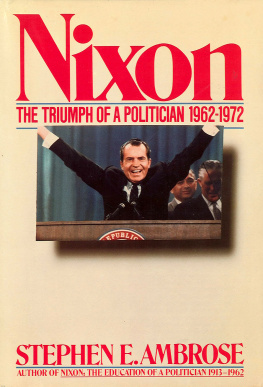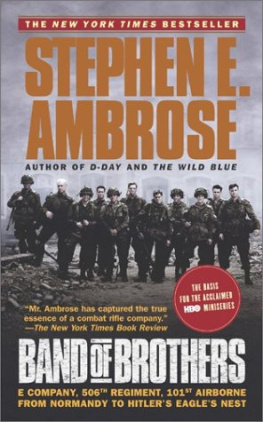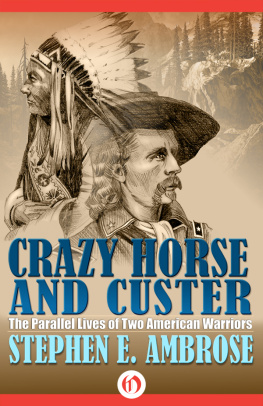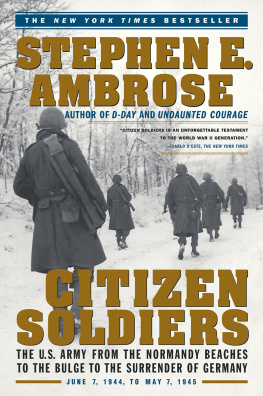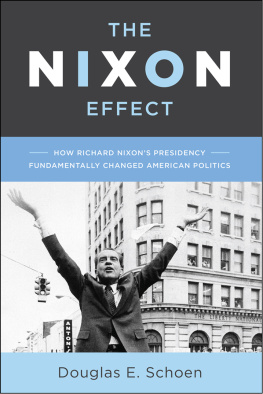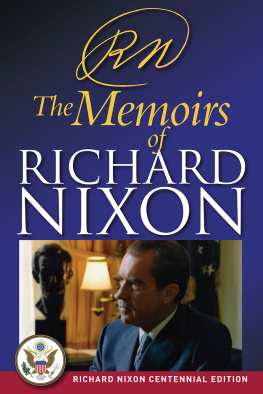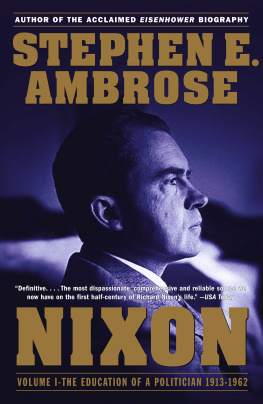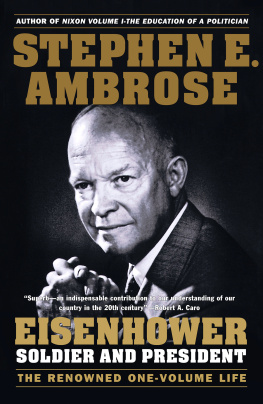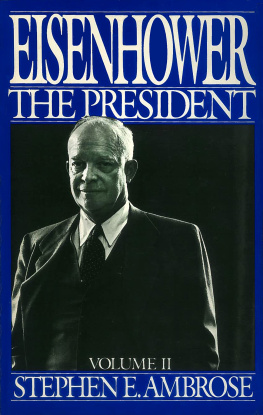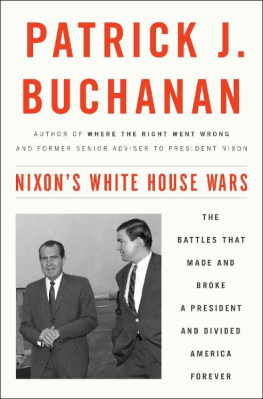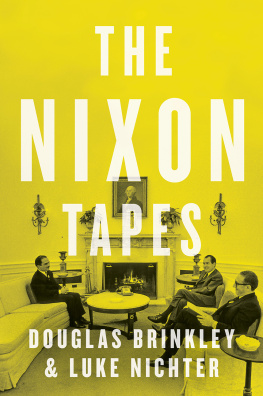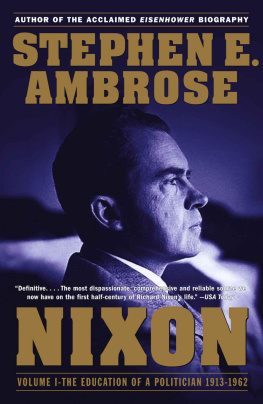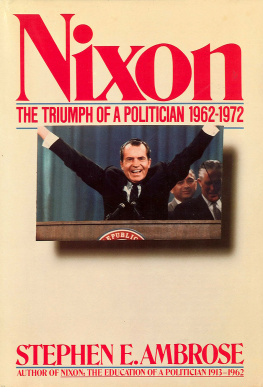Thank you for downloading this Simon & Schuster eBook.
Join our mailing list and get updates on new releases, deals, bonus content and other great books from Simon & Schuster.
C LICK H ERE T O S IGN U P
or visit us online to sign up at
eBookNews.SimonandSchuster.com
We hope you enjoyed reading this Simon & Schuster eBook.
Join our mailing list and get updates on new releases, deals, bonus content and other great books from Simon & Schuster.
C LICK H ERE T O S IGN U P
or visit us online to sign up at
eBookNews.SimonandSchuster.com
A LSO BY S TEPHEN E. A MBROSE
Upton and the Army
Halleck:
Lincolns Chief of Staff
Ikes Spies:
Eisenhower and the Espionage Establishment
Rise to Globalism:
American Foreign Policy 19381970
Crazy Horse and Custer:
The Parallel Lives of Two American Warriors
Eisenhower and Berlin, 1945
Duty, Honor, Country:
A History of West Point
The Supreme Commander:
The War Years of General Dwight D. Eisenhower
Eisenhower:
Soldier, General of the Army, President-Elect 18901952
Eisenhower:
The President
Pegasus Bridge:
June 6, 1944
Nixon:
The Education of a Politician 19131962

SIMON AND SCHUSTER
Simon & Schuster Building
Rockefeller Center
1230 Avenue of the Americas
New York, New York 10020
www.SimonandSchuster.com
Copyright 1989 by Stephen E. Ambrose
All rights reserved including the right of reproduction in whole or in part in any form.
SIMON AND SCHUSTER and colophon are registered trademarks of Simon & Schuster Inc.
Designed by Edith Fowler
Photo section researched and edited by Vincent Virga
Library of Congress Cataloging in Publication Data
Ambrose, Stephen E.
Nixon.
Includes bibliographies and indexes.
Contents: v. 1. The education of a politician, 19131962 v. 2. The triumph of a politician, 19621972.
1. Nixon, Richard M. (Richard Milhous), 1913 2. PresidentsUnited States Biography. 3. United StatesPolitics and government 1945. I. Title.
E856.A72 1987 973'.924'092 [B] 86-26126
ISBN 0-671-52836-X (v. 1)
ISBN 0-671-52837-8 (v. 2)
ISBN 13: 978-1-4767-4589-3 (eBook)
T O A LICE M AYHEW
CONTENTS
FOREWORD
T HIS IS the story that begins with Richard Nixons drive to the Presidency, which he launched at his self-proclaimed last press conference on November 7, 1962. It carries through his campaign and victory in 1968, and covers his actions as President in his first term. It ends on November 7, 1972, the day of his re-election.
The story is based, overwhelmingly, on Richard Nixons own words, written and spoken, public and private. His published memoirs provide the starting point. They are voluminous, detailed, sometimes almost embarrassingly revealing (certainly more so than any other Presidents memoirs), and usually reliable on statements of fact. His speeches, averaging almost one per day for the ten years covered in this volume, are available in newspapers and in four volumes of the Public Papers of the President. Nixons private writings consist of tens of thousands of memorandums, hand-scribbled notes and comments, drafts of speeches, and the like. Much of this material remains under seal, as Nixon continues to do legal battle with the National Archives (a situation described on ), but a great deal is available to scholars. These private papers give a unique insight into Nixons instinctive reactions and patterns of thought, his prejudices and convictions, as well as his orders and directives.
Then there are the tape-recorded conversations from the Nixon White House. They present all kinds of problems for scholars (see pause, the chuckle, the guffaw, the snarl, the intangibles that impress, inform, and elucidate. Imagine being able to listen to Abraham Lincoln talking to John Hay or John Nicolay; no matter how bad the quality of the tapes, they would give us an insight into Lincolns style and methods unavailable from any other source. So it is with Nixon.
Beyond Nixons own words, the story is based on what his closest associates said about him and his actions. No other Administration in American history has produced so much in the way of memoirs by the participants as the Nixon Administration. The reason, at least in part, is obvious: in no other Administration did so many members need so much money for such horrendous legal fees. The Nixon biographer has available the memoirs of Haldeman, Ehrlichman, Magruder, Klein, Stans, Colson, Safire, Price, Dean, Dent, and others.
And, of course, there are Henry Kissingers memoirs, by far the most voluminous of any Secretary of State. If they are also the most self-serving, they are in addition the most revealing.
As a biographer, I am concerned with what Nixon said and did, planned and hoped, attempted and achieved. As to questions of motive, of why he did what he did, I confess that I do not understand this complex man. It is not news that he was devious, manipulative, driven by unseen and unknowable forces, quick as a summer storm to blame and slow as a glacier melt to forgive, passionate in his hatreds, self-centered, untruthful, untrusting, and at times so despicable that one wants to avert ones eyes in shame and embarrassment. Nor is it news that this same man could be considerate, straightforward, sympathetic, and helpful, or that he was blessed with great talent, a superb intellect, an awesome memory, and a remarkable ability to see things whole, especially on a global scale and with regard to the world balance of power. If he was the ultimate cynic, a President without principle in domestic politics, he was also the ultimate realist, a President without peer in foreign affairs.
Why these contradictions? I dont know. I only know they were there. I see my job as one of pointing them out within the context of explaining what Nixon was doing, with what results.
I wish that I could write shorter books, but once I get going on a subject my curiosity drives me. I discover, for instance, that I want to know what Nixon did, and the only way I can find out is to do the research, then think about what Ive found, and thenthe crucial stepwrite it up. For me, the act of writing is the act of learning.
The consequence is that I make heavy demands on my readers. I hope their effort is worthwhile.
CHAPTER ONE
THE FAST TRACK
1963
I N N OVEMBER 1962, at his self-proclaimed last press conference following his loss in the California gubernatorial contest, Richard Nixon announced that he was walking out of history. You wont have Nixon to kick around anymore, he told the press. Just think how much youre going to be missing. The reporters, in response, wrote his political obituary.
In December 1962, Nixon flew to New York. While there he saw his old friend Bill Rogers, former Attorney General in the Eisenhower Administration. Its hard now to understand how far down he was, Rogers later observed. He was broke. He had no future in the field he knew best. Nixon himself said that as a political force... I am through.
But five years later, by the spring of 1968, Nixon had held hundreds of press conferences and was the almost certain Republican nominee for the Presidency. In connection with his campaign, he was writing an introduction to a new paperback edition of Six Crises. Bill Safire, one of his speech writers, was helping him. Safire suggested some fairly frank language. Nixon responded with these passages:
Next page
